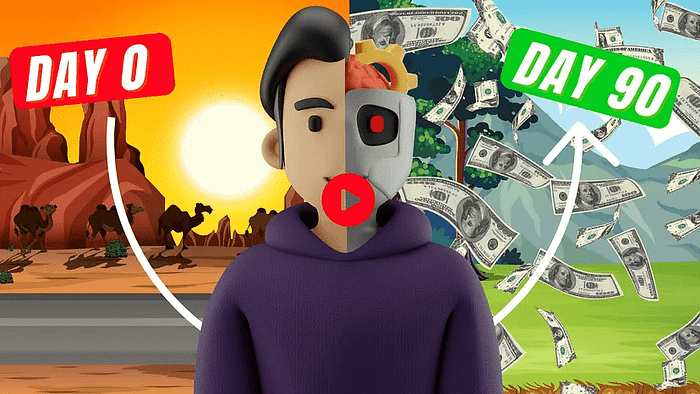Best & Worst Online Businesses to Start in 2025 (for Beginners)
Starting profitable online businesses requires careful consideration and strategic planning, especially for newcomers entering the digital marketplace. Many aspiring entrepreneurs feel overwhelmed by the countless opportunities available, but not all business models are created equal when it comes to beginner-friendly ventures.
As someone who has navigated the complexities of various online businesses, I want to share a definitive analysis of which ventures are worth your time and investment in 2025. This comprehensive guide will help you avoid common pitfalls and focus on opportunities that align with your current skills and resources.
We strongly recommend that you check out our guide on how to take advantage of AI in today’s passive income economy.
Table of Contents
Understanding the Three Main Types of Online Businesses
Diving deep into the world of online businesses, we can categorize most ventures into three distinct categories. Each category presents unique challenges and opportunities for beginners, and understanding these differences is crucial for making an informed decision about your entrepreneurial journey.
Product-Based Online Businesses (D-Tier)
Product-based online businesses might seem attractive at first glance, but they often present significant challenges for beginners. These online businesses typically involve selling physical items through various channels such as dropshipping, e-commerce stores, or print-on-demand services.
While established product-based online businesses can generate substantial revenue, they require considerable expertise and initial capital. The reality is that successful product-based online businesses demand a deep understanding of market dynamics, supply chain management, and marketing strategies.
The financial potential of product-based online businesses can be substantial, with many companies reaching multi-million dollar valuations. However, the path to profitability often involves navigating complex challenges like inventory management, shipping logistics, and customer service operations.
One critical aspect of product-based online businesses that many overlook is the need for significant traffic or an existing audience. Without substantial marketing budgets or an established following, new entrepreneurs often struggle to generate sufficient sales to sustain their operations.
Digital Product Online Businesses (C-Tier)
Digital products represent a growing segment of online businesses, encompassing everything from online courses and templates to printables and digital tools. These online businesses typically require less initial investment than physical product ventures.
The appeal of digital product online businesses lies in their scalability and potentially high profit margins. Once created, digital products can be sold repeatedly without additional production costs, making them an attractive option for entrepreneurs seeking passive income streams.
However, the seemingly low barrier to entry has created an incredibly saturated market. Many digital product online businesses struggle to stand out in an increasingly competitive landscape, where unique value propositions are essential for success.
Content-Based Online Businesses (B-Tier)
Content creation has emerged as a viable path for online businesses, offering multiple revenue streams through platforms, sponsorships, and community building. These online businesses require minimal initial investment but demand consistent effort and creativity.
The primary advantage of content-based online businesses lies in their potential to build genuine connections with audiences. Through regular engagement and value delivery, content creators can develop loyal followings that support various monetization strategies.
Success in content-based online businesses requires more than just technical skills – it demands authenticity, consistency, and adaptability. Creators must continuously evolve their content strategies to maintain relevance and engagement in an ever-changing digital landscape.
Service-Based Online Businesses: The Best Option for Beginners
Junior Freelancing (S-Tier)
Among all online businesses, junior freelancing stands out as the most accessible and promising option for beginners. This business model allows newcomers to leverage their existing skills while learning and growing professionally.
The beauty of junior freelancing online businesses lies in their low barrier to entry and immediate earning potential. Beginners can start with basic skills and gradually expand their service offerings as they gain experience and confidence.
One significant advantage of these online businesses is the opportunity to learn directly from established entrepreneurs. Working with clients provides invaluable insights into various business operations and industry best practices.
Mid to Senior Freelancing (A-Tier)
As freelancers gain experience, they can transition into more specialized and lucrative service offerings. These advanced online businesses typically command higher rates and offer greater flexibility in terms of project selection and pricing structures.
Experienced freelancers often develop sophisticated online businesses that include retainer-based services and specialized consulting. This evolution allows for more predictable income streams and stronger client relationships.
The transition from junior to senior-level online businesses requires dedication to skill development and professional growth. However, the increased earning potential and work flexibility make this progression worthwhile for committed freelancers.
Agency Model (A-Tier)
Agency-based online businesses represent the natural evolution of successful freelancing operations. These ventures allow entrepreneurs to scale their services by building teams and handling larger client projects.
While agency online businesses offer significant growth potential, they require strong management skills and established processes. Successful agencies often emerge from experienced freelancers who understand their market and client needs intimately.
Making the Right Choice for Your Future
When evaluating different online businesses, consider your current resources, skills, and long-term objectives. The most successful entrepreneurs often start with service-based models before expanding into other business types.
Remember that sustainable online businesses are built on foundations of genuine value creation and market understanding. Focus on developing skills and relationships that will support your long-term success in the digital marketplace.
As we look ahead to 2025, the landscape of online businesses continues to evolve. However, the fundamental principles of successful entrepreneurship remain constant: start with what you know, learn continuously, and build sustainable relationships with your clients and audience.
Your journey in online businesses should begin with realistic expectations and a clear understanding of the challenges ahead. By choosing the right business model for your current situation, you can build a sustainable and profitable venture that grows with your experience and expertise.

We strongly recommend that you check out our guide on how to take advantage of AI in today’s passive income economy.




